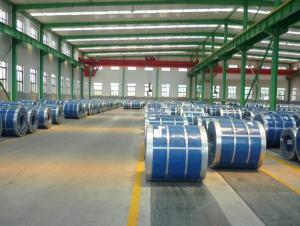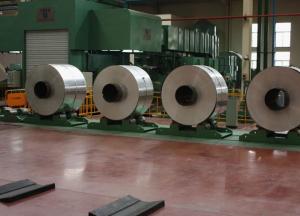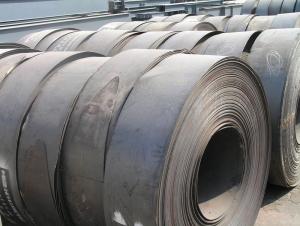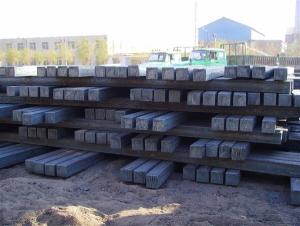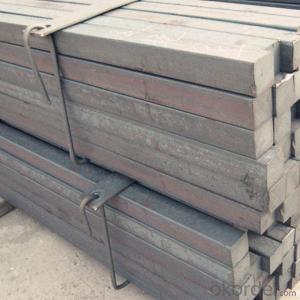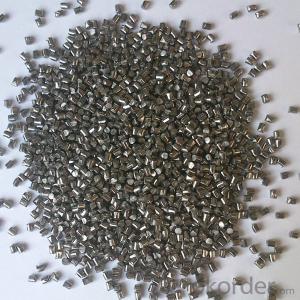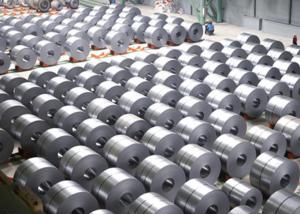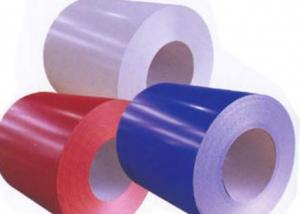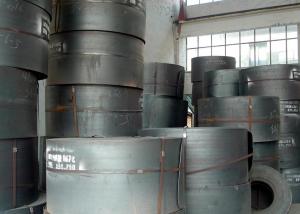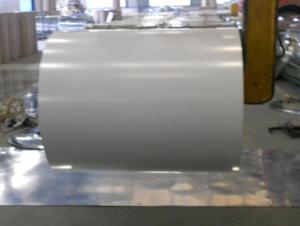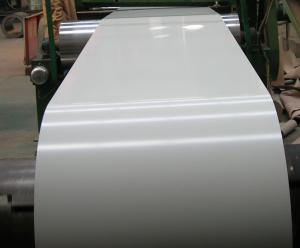Best Quality for Prepainted Galvanized Steel-Green
- Loading Port:
- China Main Port
- Payment Terms:
- TT or LC
- Min Order Qty:
- 50mt m.t.
- Supply Capability:
- 10000 tons per month m.t./month
OKorder Service Pledge
OKorder Financial Service
You Might Also Like
General Information of Prepainted Galvanized Steel Coil
With GI as base metal, after pretreatment (degrease and chemical treatment) and liquid dope with several layers of color, then after firing and cooling, finally the plate steel is called pre-painted galvanized steel. Pre-painted galvanized steel is good capable of decoration, molding, corrosion resistance. It generally displays superior workability, durability and weather resistance.
Specification of Prepainted Galvanized Steel Coil:
1. Thickness 0.23-1.2mm (BMT)
2. Zinc Coating 80-275g/m2
3. Color According to RAL color fan Internal
4. Diameter 508mm or 610mm
5. Coil Weight 4-8MT
6. Quality Commercial and structural quality
7. Paint Polyester paint for topside, epoxy for reverse
8. Standard JIS G 3312, ASTM A755M, EN 10169
9. Base Steel Grade SGCC, SGCD, DX51D+Z, DX52D+Z; S200GD, S220GD, S280GD, S350GD, CS, FS, SS
Technical Data of Prepainted Galvanized Steel Coil
Chemical Composition | C | Si | Mn | P |
0.04-0.06% | 0.01-0.03% | 0.18-0.22% | 0.014-0.016% |
Technical Data | |
Yield Strength | (Mpa) 280-320 |
Tensile Strength | (Mpa) 340-390 |
Elongation | 20%-30% |
Reverse Impact | 9J |
T-bending | ≥2T |
Pencil Hardness | ≥2H |
Duration Of Salt Spray Test | 500 H |
Bending At 180 Degree | No crack, purling and fraction |
Application of Prepainted Galvanized Steel Coil
It can be widely used in transportation, light industry, civil usage and farming. It is also the perfect building material in construction for making steel roofing, insulation panel, corrugate sheet, facade wall, shutters, T-bar and home appliance.
Package of Prepainted Galvanized Steel Coil
Full wrapped with anti-damped paper inside, iron sheet wrapped outside, and bundled by iron strips
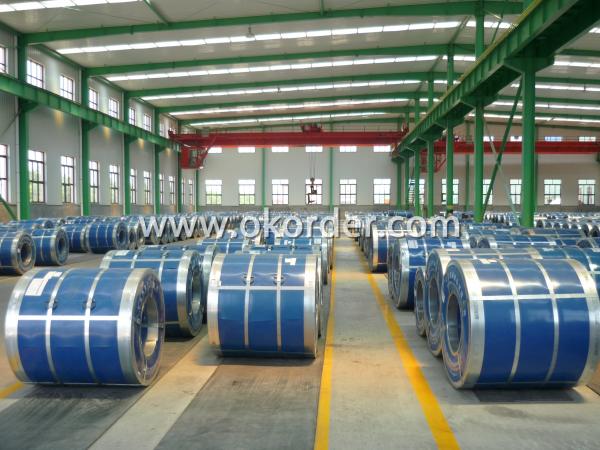
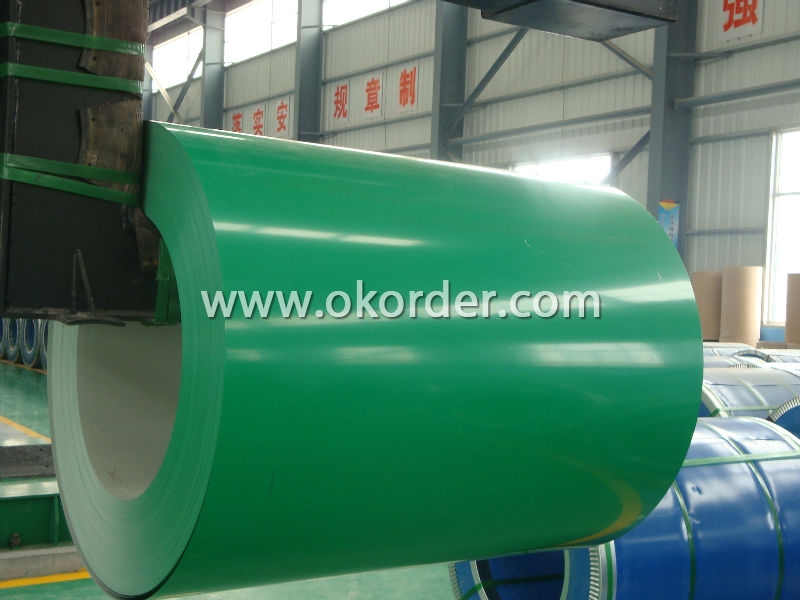
- Q:How are steel sheets used in roofing and cladding systems?
- Steel sheets are commonly used in roofing and cladding systems due to their durability, strength, and resistance to weathering. These sheets are typically installed to create a protective barrier against external elements such as rain, wind, and sunlight. Steel sheets are lightweight, easy to install, and can be customized to fit various architectural designs. They provide structural support to buildings, ensuring longevity and stability. Additionally, steel sheets offer aesthetic appeal and can be coated or painted to enhance their appearance.
- Q:How is steel rebar welded for reinforcement in concrete structures?
- Steel rebar is commonly welded for reinforcement in concrete structures using a technique called "lap splicing." This involves overlapping two rebar bars and then welding them together using electric arc welding or resistance welding methods. The welding process ensures a strong bond between the bars, providing enhanced strength and stability to the concrete structure.
- Q:What are the different types of steel gratings and their applications?
- There are several types of steel gratings, including welded steel grating, press-locked steel grating, and riveted steel grating. Welded steel grating is commonly used for industrial flooring, catwalks, and stair treads due to its durability and strength. Press-locked steel grating is often used for architectural and decorative purposes, such as walkways, platforms, and sunscreens. Riveted steel grating is suitable for heavy-duty applications such as bridge decking, truck platforms, and loading docks.
- Q:How do steel products contribute to the food and beverage industry?
- Steel products contribute to the food and beverage industry in several ways. Firstly, steel is commonly used in the construction of food processing plants and storage facilities due to its strength, durability, and resistance to corrosion. This ensures a hygienic and safe environment for the production and storage of food and beverages. Additionally, steel is utilized in the manufacturing of equipment and machinery used in food processing, such as mixers, conveyors, and packaging machines. These steel-made components are essential for various stages of food production, ensuring efficient processing, packaging, and distribution of products. Steel also plays a crucial role in the transportation and distribution of food and beverages. Steel containers, such as cans and drums, provide a secure and contamination-free packaging solution. Moreover, steel-made refrigerated containers and trucks help maintain the freshness and quality of perishable goods during transportation. Furthermore, stainless steel is widely used in kitchen equipment, utensils, and appliances. Its non-reactive nature and resistance to corrosion make it suitable for food preparation, cooking, and storage. Stainless steel surfaces are easy to clean, ensuring food safety and preventing cross-contamination. In summary, steel products contribute significantly to the food and beverage industry by providing the necessary infrastructure, machinery, equipment, and packaging solutions that ensure food safety, quality, and efficient production, storage, and distribution processes.
- Q:How do steel products contribute to the water and wastewater treatment sector?
- Steel products play a crucial role in the water and wastewater treatment sector due to their durability, strength, and corrosion resistance. They are used extensively in the construction of various infrastructure and equipment, such as pipes, tanks, pumps, and valves, which are essential for transporting, storing, and treating water and wastewater. These steel products ensure the reliability and longevity of the systems, minimizing leaks, failures, and maintenance requirements. Additionally, steel's recyclability and sustainability make it an environmentally friendly choice for the water and wastewater treatment industry.
- Q:What are the common types of steel products used in the telecommunications industry?
- Some common types of steel products used in the telecommunications industry include steel towers, poles, and cable trays. These products are essential for providing support and infrastructure for telecommunication networks, ensuring efficient transmission of signals and connectivity.
- Q:How is steel forgings inspected for quality assurance?
- Steel forgings are inspected for quality assurance through various methods such as visual inspection, dimensional measurements, non-destructive testing techniques like ultrasonic testing or magnetic particle inspection, and mechanical testing. These inspections ensure that the forgings meet the required specifications, including dimensions, surface finish, and internal soundness. Additionally, third-party certifications and audits may be conducted to ensure compliance with industry standards and customer requirements.
- Q:What are the different types of steel tanks and vessels available?
- There are several types of steel tanks and vessels available, including storage tanks, pressure vessels, mixing tanks, fermentation vessels, and process tanks. These tanks and vessels vary in terms of their design, shape, and purpose, but they all utilize steel as the primary material for their construction due to its strength and durability.
- Q:How does steel reinforcement work in concrete structures?
- Steel reinforcement works in concrete structures by providing additional strength and flexibility to the concrete. The steel bars, also known as rebar, are placed within the concrete before it sets, forming a strong bond between the two materials. This reinforcement helps to distribute the load evenly and prevent cracking or failure under heavy loads or external forces. The combination of concrete and steel creates a durable and long-lasting structure that can withstand the stresses and pressures it may encounter over time.
- Q:What are the properties of stainless steel for medical equipment?
- Stainless steel for medical equipment exhibits several key properties such as high corrosion resistance, excellent strength and durability, good heat resistance, and ease of sterilization. It is also non-reactive, biocompatible, and resistant to bacteria growth, making it a suitable material for surgical instruments, implants, and other medical devices.
1. Manufacturer Overview |
|
|---|---|
| Location | Jiangsu, China |
| Year Established | 2003 |
| Annual Output Value | US$1 Million - US$2.5 Million |
| Main Markets | Southern Asia; America; South America; Eastern Europe |
| Company Certifications | ISO 9000 ISO 14000 OHSAS 18000 |
2. Manufacturer Certificates |
|
|---|---|
| a) Certification Name | |
| Range | |
| Reference | |
| Validity Period | |
3. Manufacturer Capability |
|
|---|---|
| a)Trade Capacity | |
| Nearest Port | Shanghai |
| Export Percentage | 1% - 10% |
| No.of Employees in Trade Department | 100 People |
| Language Spoken: | English; Chinese |
| b)Factory Information | |
| Factory Size: | Above 200,000 square meters |
| No. of Production Lines | 14 |
| Contract Manufacturing | Design Service Offered |
| Product Price Range | Average |
Send your message to us
Best Quality for Prepainted Galvanized Steel-Green
- Loading Port:
- China Main Port
- Payment Terms:
- TT or LC
- Min Order Qty:
- 50mt m.t.
- Supply Capability:
- 10000 tons per month m.t./month
OKorder Service Pledge
OKorder Financial Service
Similar products
New products
Hot products
Related keywords
